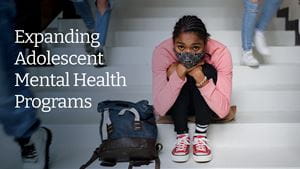
Rochester Regional's Youth and Family Behavioral Health focuses on ages 5 to 18, and currently accepts patients for open access intakes. This means families can come in on Mondays and Wednesdays from 8 a.m. to 10 a.m. You do not need an appointment, and walk-ins are encouraged. Parents or guardians can call (585) 922-7770 to access support and talk with a therapist.
Children who are facing changes in school performance, mood, sleeping, eating habits or family life, along with more serious issues like drug abuse, are welcome to walk in for immediate attention.
Rochester Regional recently launched a partnership with Monroe County schools, which places therapists directly onsite for mental health services and support. This program is currently working with ten school districts, has more than 20 satellite offices in those districts, and plans to expand to more.
Districts include:
We also have an important partnership with the Rochester City School District, providing primary care and behavioral health services in a school setting, such as:
William Pearson is an LCSW and the Program Manager of the offsite, school-based programs, and has spent more than 30 years in various behavioral health roles
“I believe you don’t know the kids unless you see the kids outside the office,” he says. “Nine out of ten times we’re dealing with kids who have issues with school. For many who come to a clinic for therapy during the school day, they’re not going to return to school that day. It’s a program that’s designed to meet the kids where they’re at - we’ve eliminated barriers around transportation, missing work or needing a sitter for other children. It has opened lines that are needed for communication between schools, families and therapists to support the child.
Essentially, the program provides outpatient mental health services in school so the students can focus on academics and their mental health simultaneously. After a child has been identified as a possible participant, they work with Rochester Regional to get the right services in place.
Clinicians and staff working with Rochester Regional Health's Behavioral Health programs are able to meet families where they are at, including their own homes. One of these programs is Home-Based Crisis Intervention (HBCI), which provides intensive in-home family therapy for children and adolescents who are at risk of psychiatric emergency room or inpatient needs.
The young patients who go through this program come out the other side better equipped. The program has a success rate of 95 percent at preventing inpatient hospitalization.
Rochester Regional also has a partnership with Recovery High School through BOCES 2 for students with substance use disorders. Children with substance use disorders can also access services at our substance use disorder clinic sites.
Read more: Changing How We Treat Addiction
“There’s such a need right now for emotional support and wellness, it’s unbelievable. Trauma and stress fatigue is a big piece of life right now for our kids, kids are in survival mode, and that goes against learning mode,” says Pearson. “Right now, every offsite patient spot is full. We have a waiting list, and we’re bringing on more staff.”
Tharaha Thavakumar, a Senior Primary Therapist with Rochester Regional Health, says this is a preferable option for children facing a behavioral crisis, as she and her colleagues are trained for those situations.
“If the child is escalated, it's important to get them in a safe spot where they can't do harm to themselves or to somebody else,” says Thavakumar. “The biggest thing is to understand that the child is in trauma and that they are in a fight-or-flight mindset, especially if they are upset or escalated. It's important to take that into consideration and to do trauma-informed care--giving them space, building that trust, listening to them, understanding what they're saying, and repeating how they're feeling … acknowledging that you know they're scared and frustrated is huge."
"Everybody is under trauma right now,” says Thavakumar. “Without understanding trauma-informed care, it's really difficult in those situations to know how to respond."